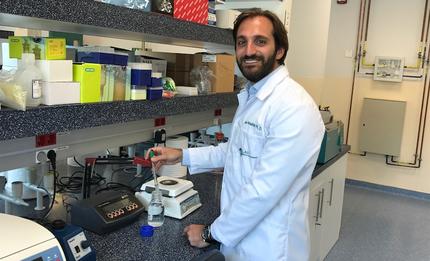New discovery may lead to prevention of tumors and neurodegenerative diseases
Groundbreaking research by Jad Abdallah of LAU’s School of Pharmacy and a team of scientists in France and U.S. may result in reversal of DNA damage.

A new discovery by Jad Abdallah, assistant professor at LAU’s School of Pharmacy, and a team of scientists in France and the US may hold the key to reversing glycation, a process within human cells that leads to DNA damage and subsequently conditions such as Parkinson’s disease, cancer and blockage of the arteries.
When the byproducts of sugar metabolism bind to nucleotides—the basic structural unit of DNA—in the human cells, DNA damage occurs. This can lead to an increased frequency of mutation, DNA strand breaks, and cytotoxicity, and subsequently to a number of conditions, including hypertension, Parkinson’s disease, cancer, blockage of the coronary arteries, and cataract in the eye. A new discovery by Jad Abdallah, assistant professor at LAU’s School of Pharmacy, and a team of scientists in France and the U.S. may hold the key to reversing this process of glycation.
Glycation refers to the spontaneous bonding of sugar molecules to DNA, RNA, and proteins without the action of enzymes, in contrast to glycosylation, which is an enzymatic process. “We already know a lot about glycosylation, but we didn’t know much about glycation,” explains Abdallah. “It is usually irreversible, but we have now discovered that a protein called DJ-1 actually reverses the process,” adds the scientist with great enthusiasm. The discovery, he says, will definitely lead to clinical research.
“Having confirmed our findings testing molecules and cells, we can now test tissues, then the whole organism.” Future research can, in parallel, also look at different types of applications. “Heated caramel darkens because it is glycated. The groundbreaking discovery may lead to interest from the food industry wanting to minimize glycation, which may impact the quality and taste of food.”
Abdallah’s focus is however on health and the plethora of conditions that can be reversed or prevented as a result of this finding. “Once glycation begins in the human body, it usually cascades, leading to cell cytotoxicity,” explains the scientist, noting that the location of the damaged cells determines the resulting disease or condition suffered. Damage to the nervous cells, for example, will result in neurodegenerative diseases, such as Parkinson’s, Alzheimer’s, and Huntington’s.
Glycation, for the most part, is not the result of lifestyle choices, so we can’t prevent it. This discovery of DJ-1 and its homologs may therefore hold the key to preventing diseases by reversing glycation before it results in multiplies. “I have recently been working with the lab where I completed my Ph.D.,” says Abdallah of the Stress Molecules Lab in France. “We focus on stress molecules and we’re therefore very interested in proteins that could help reduce stress in the cells.” This is how they came to focus on DJ-1. “We wondered why this parkinsonism-associated protein was present during cell stress, and what role it played.”
Through a series of tests utilizing a multi-faceted methodology, Abdallah and his colleagues discovered that DJ-1 promotes deglycation and constitutes a major nucleotide repair system. Their findings were this summer published in the prestigious journal Science.
More
Latest Stories
- Into the Psychology of Justice
- Alumnus Zak Kassas on Navigation, Spoofing and the Future of GPS
- Hearing Between the Lines
- LAU Hematology Conference 2025: Advancing Science Through Interdisciplinary Exchange
- Dr. Chaouki T. Abdallah Invested as LAU’s 10th President
- LAU Guides Its Students Through the Code of Conduct
- Innovative Procedure at LAU Medical Center–Rizk Hospital Signals Hope for a Patient With a Congenital Disease
- LAU’s Inaugural PodChat Session Addresses AI Detection in the Classroom

